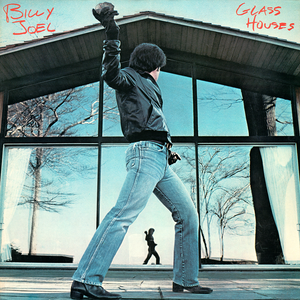Published on Jan 19, 2005
I hate it when people can predict what I’m going to do in a
conversation or situation. My family is particularly good at this,
and it annoys me to no end. Why? I don’t like to be pegged down as
doing this or that when something happens. Billy Joel must have
been feeling the same way in 1980. His previous albums had been
deemed by the critics to be “soft” or “ballad heavy.” So what did
Joel do? He went out and recorded
Glass Houses, a blatant attempt to prove the critics
wrong.
Around the time of
Glass Houses‘ recording, the music industry was changing
rapidly. Disco was now dead, and punk and new wave were starting to
take shape. While very little of the songs on
Glass Houses sound like punk, the attitude is relatively
similar. Joel’s albums always have had an edge to them, reflecting
the darker side of humanity, and
Glass Houses fits in well with that disillusionment. “Closer
To The Borderline” features a man on the verge of snapping as the
toils of life bear down on him. “Sleeping With The Television On.”
“I Don’t Want To Be Alone Anymore” deal with strong senses of
isolation and desires for companionship.
Glass Houses is definitely not an upbeat album.
That being said there are some positive moments on the album.
The French Flavored ” C’etait Toi (You Were the One)” is pleasant
romantic number. One of the hits, the acoustic driven “Don’t Ask Me
Why” is probably the most lightweight moment on
Glass Houses, but that doesn’t detract from it’s quality.
Most people would know “You May Be Right” as the biggest hit, and
it is deserving of its success. It’s got a great chorus, and rocks
more than the usual Bill Joel hit.
As I said earlier,
Glass Houses reflects the musical tastes that were en vogue
at the time. This is a stripped down, guitar oriented sound that
the listener is presented with, very different from previous
albums. “It’s Still Rock N Roll To Me” and “All For Leyna” very
much resemble the sound of ’80s rock. The latter’s opening
especially reminds me of Toto’s “Hold The Line” And once again,
Joel turns in a very impressive vocal performance. Whether it be a
gritty, snarling vocal required for “You May Be Right” or shades of
falsetto on “C’etait Toi” Joel is up to the task.
The two Billy Joel albums I owned before
Glass Houses were
The Stranger and
An Innocent Man, both records I would describe as “poppy.”
Now, both are favorites of mine, because good pop is, well,
enjoyable. However, the fact that
Glass Houses was such an effective rock record was a
surprise, and a welcome one. What does this teach us? Critics are
always wrong…. except for us.
